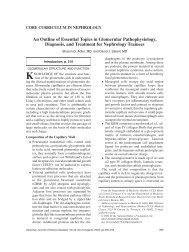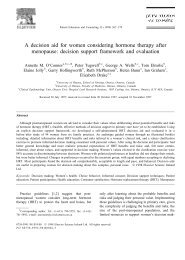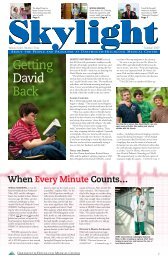Surgery and Healing in the Developing World - Dartmouth-Hitchcock
Surgery and Healing in the Developing World - Dartmouth-Hitchcock
Surgery and Healing in the Developing World - Dartmouth-Hitchcock
Create successful ePaper yourself
Turn your PDF publications into a flip-book with our unique Google optimized e-Paper software.
Communication <strong>in</strong> <strong>the</strong> Third <strong>World</strong>: A One-Way Street<br />
(sobrien@denverpost.com). The health sciences literature is not bereft of<br />
such “dicey” examples.<br />
2. The constant new versions <strong>and</strong> variety of software pushes up <strong>the</strong> cost <strong>and</strong><br />
dim<strong>in</strong>ishes <strong>the</strong> ease of communication. This is especially a problem for<br />
colleagues <strong>in</strong> develop<strong>in</strong>g areas that need to have stability for purposes of<br />
conta<strong>in</strong><strong>in</strong>g cost, of hardware <strong>and</strong> software. It is <strong>in</strong>terest<strong>in</strong>g that <strong>in</strong> some<br />
develop<strong>in</strong>g countries <strong>the</strong> cutt<strong>in</strong>g edge of software <strong>and</strong> technical application<br />
is ma<strong>in</strong>ta<strong>in</strong>ed <strong>in</strong> advance of one’s own pace.<br />
3. The gap of “haves <strong>and</strong> have-nots” (basically an economic designation) is<br />
exp<strong>and</strong><strong>in</strong>g faster as <strong>the</strong> speed of change accelerates. This does not mean<br />
that advances are not occurr<strong>in</strong>g <strong>in</strong> <strong>the</strong> develop<strong>in</strong>g countries, but it does<br />
mean that “catch<strong>in</strong>g up”, <strong>in</strong> a conventional sense, is <strong>in</strong>creas<strong>in</strong>gly impossible.<br />
Catch<strong>in</strong>g up is <strong>the</strong> issue central to this chapter <strong>and</strong> is discussed<br />
fur<strong>the</strong>r on.<br />
4. The gap <strong>in</strong> access to <strong>in</strong>formation via <strong>the</strong> Internet by develop<strong>in</strong>g areas is<br />
not so much <strong>the</strong> issue as is <strong>the</strong> abject lack of participation by professionals<br />
<strong>in</strong> develop<strong>in</strong>g areas. The research base for conventional health science<br />
endeavors is huge <strong>and</strong> exp<strong>and</strong><strong>in</strong>g <strong>in</strong> economically developed countries. It<br />
is small, as a result of decades of neglect, <strong>and</strong> shr<strong>in</strong>k<strong>in</strong>g <strong>in</strong> develop<strong>in</strong>g<br />
areas. The <strong>in</strong>formation <strong>and</strong> research <strong>in</strong> developed countries is so dom<strong>in</strong>ant<br />
it excludes <strong>and</strong> dismisses research generated <strong>in</strong> develop<strong>in</strong>g countries.<br />
The participation of develop<strong>in</strong>g countries <strong>in</strong> <strong>the</strong> ma<strong>in</strong>stream health sciences<br />
literature is nearly <strong>in</strong>visible. “Lost Science <strong>in</strong> <strong>the</strong> Third <strong>World</strong>” by<br />
W. Wyatt Gibbs <strong>in</strong> Scientific American, August 1995, pages 92-99, documents<br />
<strong>the</strong> severity <strong>and</strong> rationales of <strong>the</strong> problem.<br />
Questions <strong>and</strong> Answers:<br />
1. Does <strong>the</strong> develop<strong>in</strong>g world have anyth<strong>in</strong>g worth say<strong>in</strong>g?<br />
2. Who speaks for <strong>the</strong> develop<strong>in</strong>g world?<br />
3. What is <strong>the</strong> content, assum<strong>in</strong>g usefulness <strong>in</strong> what is submitted?<br />
4. What format is suitable for develop<strong>in</strong>g country submissions?<br />
The evolution of <strong>in</strong>formation priorities has been slowly chang<strong>in</strong>g over <strong>the</strong> last<br />
15 years. In 1985 <strong>the</strong>re was no question about <strong>the</strong> need for access to developed<br />
nation’s <strong>in</strong>formation <strong>in</strong> any form from books <strong>and</strong> paper journals to citation <strong>in</strong>dices.<br />
Over <strong>the</strong> last 4 years access to <strong>the</strong> literature <strong>in</strong> an electronic format via <strong>the</strong> Internet<br />
has provided cost effective, fast access. What is emerg<strong>in</strong>g is a need for realistic report<strong>in</strong>g<br />
<strong>and</strong> research by <strong>and</strong> <strong>in</strong> develop<strong>in</strong>g countries. The need for <strong>in</strong>formation<br />
from <strong>the</strong> West obscured <strong>the</strong> gross deficiency <strong>in</strong> report<strong>in</strong>g by develop<strong>in</strong>g countries.<br />
Health care is a global concern <strong>and</strong> affects all countries regardless of economics of<br />
political boundaries. It is also a reality that most of <strong>the</strong> world’s population has access<br />
to marg<strong>in</strong>al health care services. This level of health services is go<strong>in</strong>g to persist for<br />
several generations <strong>and</strong> <strong>in</strong>deed is <strong>in</strong>creas<strong>in</strong>gly catastrophic. HIV <strong>in</strong> Africa is forc<strong>in</strong>g<br />
reevaluation of how <strong>the</strong> rich nations are go<strong>in</strong>g to relate to <strong>the</strong> poor nations <strong>in</strong> matters<br />
of health. This dilemma can be exp<strong>and</strong>ed to many o<strong>the</strong>r areas of health sciences<br />
like malaria <strong>and</strong> tuberculosis.<br />
British Medical Journal’s “news extra” (BMJ 2000; 320: 1692 (24 June) reports<br />
from New Delhi a very important <strong>in</strong>sight <strong>and</strong> perspective that has been too long <strong>in</strong><br />
com<strong>in</strong>g. Although <strong>the</strong> new journal, Austral-Asian Journal of Cancer, is focused on<br />
cancer it “is expected to provide a forum for devis<strong>in</strong>g palliative care strategies for<br />
develop<strong>in</strong>g countries.” Dr. M Krishanan Nair, director of India’s Regional Cancer<br />
95<br />
12










